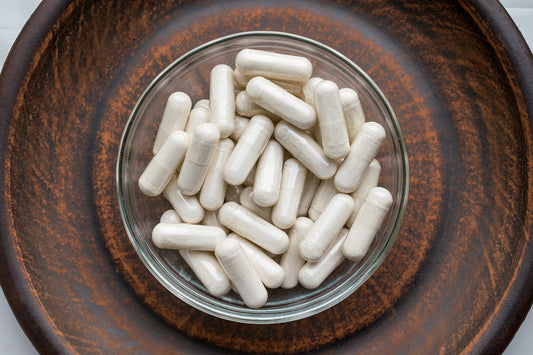Introduction
Nature provides all of the resources that we need to sustain health, particularly from the marvelous plants that humans have found and tested over time.The sunflower is one such plant that has been more recently investigated for its health-promoting benefits, not just for the beauty that it provides.We now know that the sunflower provides key nutritional compounds, such as lecithin, which highlight this plant’s usefulness to human health.In this article, we will discuss sunflower lecithin and its benefits, providing evidence for why it is a key ingredient in Daily Brain Care.
What is Sunflower Lecithin?
Sunflower lecithin comes from the gum of the sunflower kernel after it has been dehydrated. Sunflower lecithin is commonly made by cold pressing the gum, which means that it has minimal processing without the use of chemicals like ethanol or heat to produce the final material. Sunflower is also not genetically modified, compared to soy that is commonly raised from genetically modified crops and is the usual source of lecithin, and sunflower lecithin is also gluten-free. Liquid sunflower lecithin and sunflower lecithin powder are used as emulsifiers in different food products, such as baked goods, as they provide a bulking and stabilizing material to keep foods intact and more satisfying for consumers in terms of making a smoother texture. In addition to their consumer-friendly characteristics, these lecithin foods also provide nutritional benefits.
Sunflower Lecithin Benefits
As mentioned above, sunflower is not genetically modified and it does not commonly cause allergies or sensitivities, making it a superior source of lecithin compared to soy.Perhaps the most beneficial and significant component of lecithin is choline, an essential nutrient (i.e., it must be acquired from the diet) that is utilized by the body for many different tasks.For example, choline is:(1) involved in making our cell membranes, (2) important in multiple aspects of metabolism, (3) needed for making acetylcholine, a key neurotransmitter involved in all aspects of the operation of the central nervous system, and (4) important for the growth of our brain during childhood (Dauncey, 2014; National Institutes of Health Office of Dietary Supplements, 2022; Poly, 2011; Ueland, 2011). Till just now, you may not have thought of choline as being as important as other nutrients like vitamins C and D and calcium, but as scientists have continued to discover the various roles that choline plays at the cellular level, it is absolutely crucial that we get plenty of choline daily from our food and dietary supplements.
Sunflower lecithin is also high in a fatty acid or lipid-hybrid structure called phosphatidylinositol, which is also a very important part of our cells’ membranes and for all of the signaling and communication processes that occur within and between cells (Li et al., 2020).In addition to these beneficial components, sunflower lecithin also contains notable amounts of calcium, phosphorous, and potassium, according to the U.S. Department of Agriculture’s FoodData Central’s database.These minerals are crucial to countless cellular and organ functions and once again must be acquired through our diet.
Finally, although the clinical research evidence for sunflower lecithin’s health benefits is limited, what is known is that due to its natural action as an emulsifier it can actually help to create more bioavailable and absorbable final products that ultimately mean that the active ingredients are more effective.An emulsifier is simply a material that is used to make other compounds more stable when they are mixed together.These are usually compounds that do not naturally mix together, but have to be shaken or heated to create the emulsion.Sunflower lecithin, due to its natural properties, is an effective emulsifier and in one study was shown to be superior in comparison to synthetic material for creating a stable final product (Liang et al., 2017).Thus, sunflower lecithin serves not only as a source of high-quality nutrient content, but it also mixes well with other materials to help them become more effective as well.
Conclusion
Sunflower lecithin is a natural, non-genetically modified, gluten-free material that provides nutrients that are typically low in the modern diet.Sunflower lecithin is a great source of choline, phosphatidylinositol, and several minerals that are important for achieving and maintaining good health.Just the choline alone helps to give Daily Brain Care an additional brain-enhancing boost to what the other ingredients in the formula provide.Enjoy the benefits that you get from sunflower lecithin with the convenience of a multi-nutrient product like Daily Brain Care.
FAQs
What does sunflower lecithin do?
Sunflower lecithin is an active ingredient in foods and dietary supplements, providing a rich source of choline, phosphatidylinositol, and several minerals that are important for achieving and maintaining good health. Sunflower lecithin also acts as an emulsifier to enhance the benefits of other ingredients and compounds after they have been mixed together.
What is sunflower lecithin good for?
Sunflower lecithin is good for providing a source of choline, phosphatidylinositol, calcium, phosphorous, and potassium, nutrients that are important for many biological functions throughout the body, particularly for the brain, central nervous system, and heart.
How much sunflower lecithin to use?
You can use a generous amount of sunflower lecithin every day. For example, 1.33 tablespoons (10 grams) provide 2% of the daily value of calcium, 20% of the daily value of phosphorous, and 2% of the daily value of potassium.
Is sunflower lecithin bad for you?
Sunflower lecithin is NOT bad for you! It provides a source of key nutrients that many people lack in the modern diet, it is not genetically modified, and it is gluten-free. In addition, it mixes well with many other ingredients, so it is easy to add to virtually any recipe for baked goods or to dietary supplement formulas.
References
Dauncey MJ. Nutrition, the brain and cognitive decline: insights from epigenetics. Eur J Clin Nutr. 2014 Nov;68(11):1179-85. doi: 10.1038/ejcn.2014.173. PMID: 25182020.
Li S, Ghosh C, Xing Y, Sun Y. Phosphatidylinositol 4,5-bisphosphate in the Control of Membrane Trafficking. Int J Biol Sci. 2020 Aug 25;16(15):2761-2774. doi: 10.7150/ijbs.49665. PMID: 33061794; PMCID: PMC7545710.
Liang L, Chen F, Wang X, Jin Q, Decker EA, McClements DJ. Physical and Oxidative Stability of Flaxseed Oil-in-Water Emulsions Fabricated from Sunflower Lecithins: Impact of Blending Lecithins with Different Phospholipid Profiles. J Agric Food Chem. 2017 Jun 14;65(23):4755-4765. doi: 10.1021/acs.jafc.7b01469. PMID: 28534401.
National Institutes of Health Office of Dietary Supplements. (June 2, 2022). Choline - Fact sheet for health professionals. Available at: https://ods.od.nih.gov/factsheets/Choline-HealthProfessional/. Accessed June 16, 2023.
Poly C, Massaro JM, Seshadri S, Wolf PA, Cho E, Krall E, Jacques PF, Au R. The relation of dietary choline to cognitive performance and white-matter hyperintensity in the Framingham Offspring Cohort. Am J Clin Nutr. 2011 Dec;94(6):1584-91. doi: 10.3945/ajcn.110.008938. PMID: 22071706; PMCID: PMC3252552.
Ueland PM. Choline and betaine in health and disease. J Inherit Metab Dis. 2011 Feb;34(1):3-15. doi: 10.1007/s10545-010-9088-4. PMID: 20446114.




